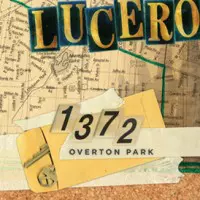I distinctly remember being alone in a dimly lit bar a couple years ago. It was a Sunday during finals week, and I didn't have an exam the following day but none of my friends felt like joining me. As I sat at the bar with my beer, Lucero's "She Wakes When She Dreams" came over the jukebox.
The middle-aged man to my left closed his eyes as he nodded his head to the slow, acoustic rhythm. The couple behind me cut their conversation short to listen intently. I stopped playing Tetris on my phone so I could hang on every word.
There's just something so gripping in singer Ben Nichols' voice that Lucero fans and people who have likely never heard the band before find themselves instantly gravitating to his earnest ruminations about life and the relationships that shape it. So now the Memphis quartet is back with 1372 Overton Park, their sixth studio album, and things are a just a little bit different this time around.
For the first time, a horn section adorns Nichols' southern drawl and the band's down-south twang, and while it sounds somewhat jarring the first time it's heard, the horns actually add an interesting element to the simple, upbeat "What Are You Willing to Lose?" and an accent to the peaks of the gruff "Sound of the City."
While the new inclusion works well, for the most part the band sticks to what they're good at: powerful songs that tug on all the right strings. "Hey Darlin' Do You Gamble" is vintage Lucero -- Nichols' somber baritone glides over light strumming and tactful percussion to plainly ask "darlin', would you take a chance on me?" It's in such simple but beautiful language that Nichols is able to relate to the college kid, the couple and the middle-aged man in one fell swoop. Lucero's simple eloquence is universal and it is timeless.
Lucero has equal command in more up-tempo affairs, as the rollicking "The Devil and Maggie Chascarillio" and the Skynyrd-inspired "Sixes and Sevens" provide a one-two punch right that infuses the middle of the record with some real energy. Both songs give Nichols a chance to cut loose vocally while the riffs are a great mix of old-style country and rock ân' roll. "Sixes" effortlessly works in horns and keyboard as Nichols howls over some rambling chord progressions and "Johnny Davis" is a short punk-based jaunt that leads into Lucero's bread-and-butter.
"Mom" closes out the album in heartbreaking fashion. Over the simple-but-powerful combination plucking of electric strings and harmonica, Nichols sings a heartfelt tribute to his mother:
Momma you know we might make some mistakes, and if we should fault it's us who should be blamed / Don't you think twice about what's wrong and right, we learned it a long time ago / We keep it close, and you're with us tonight / Home, it might scatter and fade, with time, all things must change / The route might take its own course, but momma weâre still your boys."
It's one of the rare songs that strikes so personal a chord that it really takes you aback. It makes you evaluate your own family situation. It makes you thankful for everything you have.
And that's Lucero in a nutshell. For 10 years the four boys from Memphis have been writing songs woven into the American and emotional fabrics. No one is lost on their appeal. Not the middle-aged man hearing their music for the very first time. Not the couple that realizes how happy they are together just by hearing Nichols' voice. And not the college kid sitting at the bar alone.
Lucero writes songs for us all.
